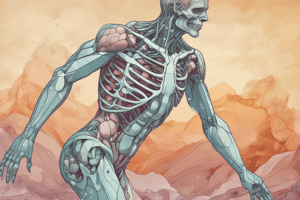Podcast
Questions and Answers
What role does selenium play in the body?
What role does selenium play in the body?
- Regulates calcium levels
- Essential for thyroid hormone metabolism (correct)
- Boosts iron absorption
- Converts glucose to energy
What is a possible consequence of selenium deficiency?
What is a possible consequence of selenium deficiency?
- Sodium overload
- Increased vitamin D production
- Increased hemoglobin levels
- Protein-energy malnutrition (correct)
Excess absorption of which trace mineral can lead to bony deformities?
Excess absorption of which trace mineral can lead to bony deformities?
- Selenium
- Boron
- Molybdenum (correct)
- Vanadium
Which mineral is said to play a role in carbohydrate metabolism?
Which mineral is said to play a role in carbohydrate metabolism?
Which trace mineral may affect bone health if deficient?
Which trace mineral may affect bone health if deficient?
What condition is characterized by involuntary muscle contractions due to calcium deficiency?
What condition is characterized by involuntary muscle contractions due to calcium deficiency?
Which of the following is a modifiable risk factor for osteoporosis?
Which of the following is a modifiable risk factor for osteoporosis?
What is the primary function of phosphorus in the body?
What is the primary function of phosphorus in the body?
Which dietary factor reduces the absorption of calcium?
Which dietary factor reduces the absorption of calcium?
Which condition occurs when there is chronically insufficient calcium intake?
Which condition occurs when there is chronically insufficient calcium intake?
From where in the body is the majority of phosphorus found?
From where in the body is the majority of phosphorus found?
What is a sign of magnesium deficiency?
What is a sign of magnesium deficiency?
What dietary source is particularly good for calcium intake?
What dietary source is particularly good for calcium intake?
What is a primary cause of sodium deficiency?
What is a primary cause of sodium deficiency?
Which mineral is essential for oxygen transport in the body?
Which mineral is essential for oxygen transport in the body?
Which factor can increase iron absorption?
Which factor can increase iron absorption?
What is a common symptom of severe zinc deficiency?
What is a common symptom of severe zinc deficiency?
What is the main function of fluoride in the body?
What is the main function of fluoride in the body?
Which mineral deficiency can lead to goiter?
Which mineral deficiency can lead to goiter?
What is a significant consequence of iron deficiency anemia?
What is a significant consequence of iron deficiency anemia?
Which of the following can interfere with zinc utilization?
Which of the following can interfere with zinc utilization?
Which of the following foods is a significant source of iodine?
Which of the following foods is a significant source of iodine?
What is the daily requirement for major minerals?
What is the daily requirement for major minerals?
What is a possible cause of poor mineral status?
What is a possible cause of poor mineral status?
Which of the following statements about trace minerals is true?
Which of the following statements about trace minerals is true?
Which mineral is primarily associated with strong bones and teeth?
Which mineral is primarily associated with strong bones and teeth?
What commonly leads to mineral toxicity?
What commonly leads to mineral toxicity?
Which factor affects mineral bioavailability?
Which factor affects mineral bioavailability?
Flashcards are hidden until you start studying
Study Notes
Minerals Overview
- More than 50 chemical elements are essential for human growth, repair, and vital functions.
- Minerals are categorized into major minerals (macro-minerals, >100mg/day) and trace minerals (micro-minerals, <20mg/day).
- Trace contaminants (lead, mercury, barium, boron, aluminum) lack known functions and are harmful.
Characteristics of Minerals
- Inorganic elements, which can combine with other compounds.
- Not a source of energy.
- Functions include:
- Providing structure.
- Maintaining fluid balance.
- Serving as cofactors and coenzymes.
- Facilitating nerve transmission and muscle contraction.
- Acting as reserves.
Mineral Balance and Deficiency
- Balance is maintained through body adjustments in absorption and excretion.
- Poor mineral status arises from insufficient intake, interactions, decreased absorption, and increased excretion.
- Mineral toxicity results from excessive intake, altered metabolism, and environmental exposure.
Major Minerals
Calcium
- Constitutes 1.5-2% of adult body weight, primarily in bones (98%).
- Functions:
- Bone and teeth development.
- Nerve impulse transmission.
- Blood clotting.
- Heart and muscle contraction.
- Health benefits: Strong bones, reduced chronic disease risk.
- Sources: Dairy, leafy greens, cereals, supplements.
Hypocalcemia
- Condition of low blood calcium levels, potentially caused by several diseases or deficiencies.
- Deficiency risks: Rickets, osteomalacia, tetany, osteoporosis.
Phosphorus
- Primarily found in bones and teeth (85%).
- Functions: Bone formation, cell structure, and metabolism.
- Sources: Milk, meat, fish; less in whole grains and legumes due to phytic acid.
Magnesium
- 50% is located in bones, with a kidney role in homeostasis.
- Functions include enzyme reactions, heart rhythm maintenance, and electrolyte regulation.
- Best sources: Leafy vegetables, whole grains, nuts.
- Deficiency: Related to several health issues, including depression and muscular contractions.
Electrolytes
- Sodium, potassium, and chloride maintain fluid and acid-base balance, nerve conduction, and membrane permeability.
- Sodium deficiency (hyponatremia) can result from excessive losses.
- Potassium sources: Fruits, vegetables, legumes; deficiencies can affect blood pressure and kidney health.
Trace Minerals
- Present in the body in amounts <5 grams, required daily in <100mg.
- Functions: Vital for myriad cellular processes and metabolism.
Iron
- Essential for oxygen transport; forms vary in absorption efficiency.
- Heme iron (animal sources) is better absorbed than non-heme iron (plant sources).
- Deficiency may lead to anemia, symptoms include fatigue and heart rate increase.
Zinc
- Key for over 300 enzymatic functions and immune systems.
- Mild deficiency: growth reduction, loss of taste; severe deficiency: growth retardation and delayed sexual maturation.
- Major sources: Seafood, meats, fortified cereals.
Fluoride
- Essential for bone and dental health, predominantly found in bones and teeth.
- Sources: Fluoridated water, seafood; deficiency leads to tooth decay.
Iodine
- Crucial for thyroid hormone production (T3 and T4), growth, and metabolism.
- Best sources: Seafoods, iodized salt; deficiency can cause goiter and cognitive impairments.
Manganese
- Functions include enzyme cofactor roles and bone formation.
- Deficiency can impair growth and reproductive functions; sources include whole grains and nuts.
Selenium
- Antioxidant properties essential for thyroid hormone metabolism.
- Deficiency linked to malnutrition and hypothyroidism.
Nonessential Trace Minerals
- Include arsenic, boron, nickel, silicon, vanadium; no known deficiency effects but some have health impacts.
Risk Factors for Osteoporosis
- Nonmodifiable: Female gender, age, frame size, ethnicity, family history, personal history of fractures, hormonal deficiencies.
- Modifiable: Sedentary lifestyle, inadequate calcium/Vitamin D intake, excessive protein/sodium, smoking, alcohol abuse, low body weight.
General Note on Nutritional Balance
- Adequate intake of macro and micro-minerals supports overall health, preventing various deficiencies and chronic diseases.
- Lifestyle and diet play crucial roles in maintaining mineral status.
Studying That Suits You
Use AI to generate personalized quizzes and flashcards to suit your learning preferences.




